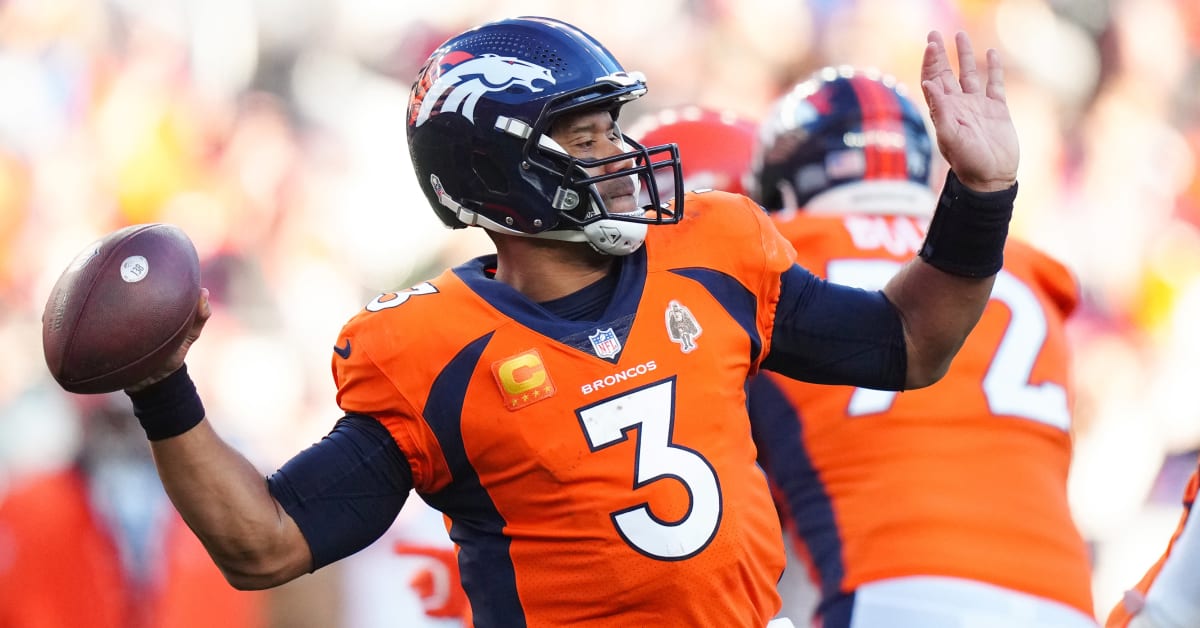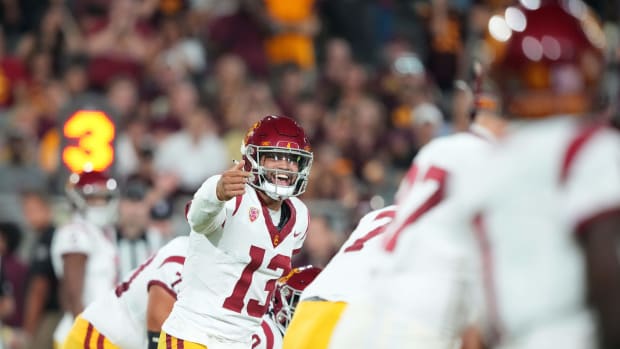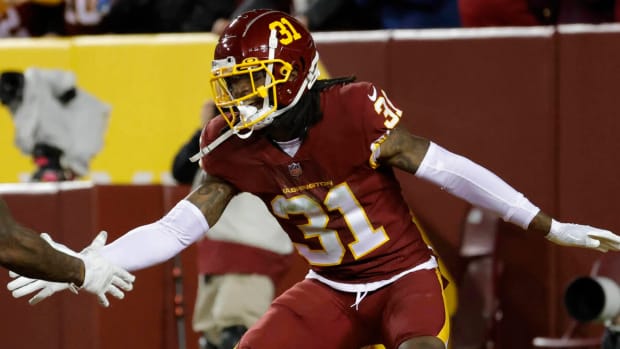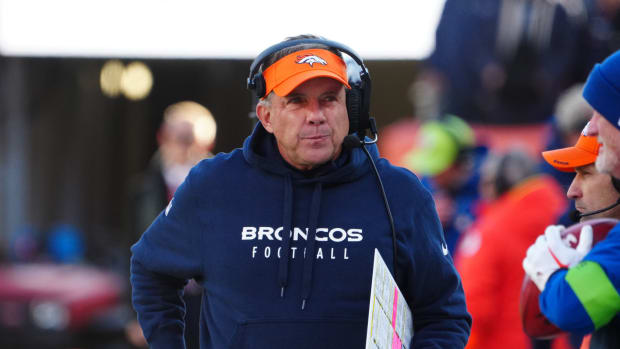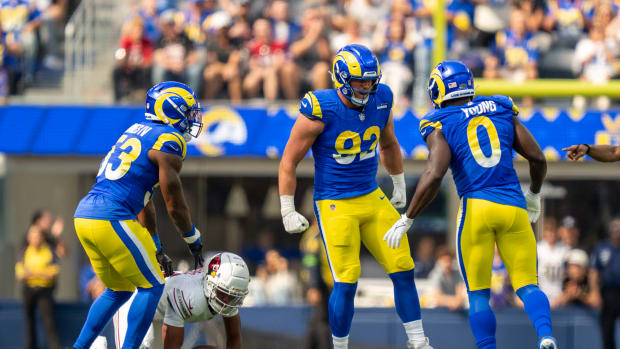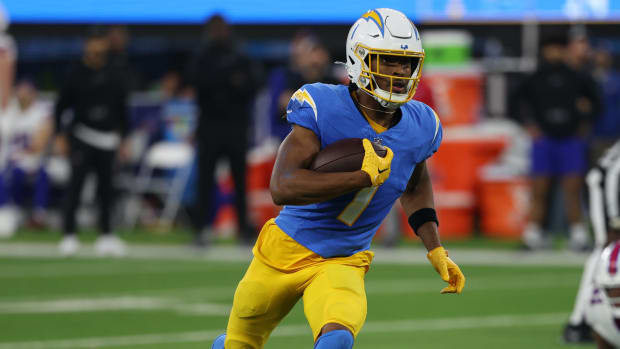The 2023 Broncos Have Yet Another Version of Russell Wilson Coming to Life
The numbers say what Russell Wilson could not, projecting confidence and aptitude amid a resurgence many predicted he’d never embark upon. In his second season with the Broncos, Wilson’s completion percentage is up almost 8%; his yards per attempt is down; his touchdown tally has already eclipsed last season’s total; and his interception rate hovers close to his career low. Through 11 games, Wilson has surpassed 300 passing yards twice, led four game-winning drives, thrown multiple touchdown passes in six separate weeks, run for a career high number of touchdowns already and, in a larger sense, resurrected his career.
Don’t look now. After winning five straight games, the Broncos (6–5) are in the playoff hunt at minimum and two games behind the Chiefs in the AFC West. Hence this story idea: to watch their latest victory, a dominant performance against the Browns, and hunt for one play—just one—that embodies Wilson’s evolution under Sean Payton, the quarterback whisperer who once seemed overmatched in Denver. Surely, there is a sign that signaled both how they arrived here and what’s coming.
Let’s ride?
The Broncos kicked off in the late window of Week 12 after winning the coin toss and choosing to defer. With a chance to watch the Browns’ opening drive, Denver’s offense may have noticed a quarterback situation that now stands in direct opposition to their own. While Cleveland has rotated through signal-callers due to injuries and performance, Denver locked Wilson into its 2023 starting lineup, despite the quarterback coming off a campaign that ranked among the worst of his career. As the season went on, the reward for an uncommon trait amongst NFL executives—patience—continued forming.
On its first possession, the Broncos’ offense began the late afternoon carefully, with four consecutive runs, including one, by Wilson, that converted a third down. His first pass went to a running back, on a designed screen, in the right flat. This approach—deliberate, steady, establish the run, pick spots to throw, major on efficiency—is part of the evolution with Payton and his latest whisper-ee. “System quarterback” is an often-derisive term for NFL signal-callers. But that’s a silly notion to begin with. All quarterbacks are one. Some just elevate systems more, adding dimensions and broadening what’s possible.
Wilson threw one wobbler on that initial drive, but it was due to pressure coming from a defense that ranks among the most feared in the NFL. His mindset—always having been similar to whiteboards, in that it’s forever erasable—meant there was no need for concern. That’s part of the evolution, too. Wilson never doubted what seemed reasonable, even prudent, to suggest: the notion that his best days were behind him, part of that magical Seahawks run, the dynasty that never formed and all the distrust that still lingers. Rather than coming apart from frustration, Wilson dropped a pass to Courtland Sutton on a crossing route, the timing so ideal that Sutton turbo-boosted downfield for 31 yards. This set up Denver’s first touchdown.
Was that play the singular embodiment of a resurgence? No, not quite.
I’ve been described as a Chief Wilson Antagonist. A brief clarification: When the Seahawks were playing for Super Bowl titles, I wrote that, wrote Wilson, wrote cover stories about Wilson … and I always believed he received too much credit for their success. When everything unraveled, I wrote that, too, even picking up a few half-hearted death threats from Seattle’s ever-more-sensitive fan base. But when his career fell apart in Denver, I thought the opposite. Wilson wasn’t magical last season. He wasn’t elite. But he wasn’t as terrible as many made him out to be, and that thought process applied (maybe even more so) to the beginning of this season, despite five losses for the Broncos in their first six games. Wilson wasn’t exactly the same, but he also wasn’t two totally different quarterbacks in, say, 2015 and ’22. If anything, he was closer to similar than common perceptions allowed.
About that play, though. The hunt continued. Denver’s second possession started after a Browns fumble, included a wayward incompletion to Javonte Williams and ended with a smart fourth-down call where Wilson scrambled (evincing the best Seattle days), picked up the first and then lost control of the ball when a defender punched a fumble loose. Was this evidence that Wilson wasn’t, and isn’t, perfect? Of course. But that was apparent even at his peak with the Seahawks. The key with Wilson, according to scouts and assistant coaches, is channeling his strengths, hunting for the center of his Venn diagram. Ideally, that means allowing for creativity and spontaneity, the kinds that produce vintage and classic Wilson moments. Anyone who allows those same qualities to run unchecked risks the less-than-ideal Wilson moments (turnovers, inefficiency, unnecessary risk assumed).
No definitive play yet. Just Wilson being Wilson, the great, the “whoops” and everything else wrapped into a single quarter Sunday.
At this point in his career, these are Wilson’s strengths: experience, culled from 184 regular-season starts; mobility and versatility, albeit with speed that diminishes a little every season; and a strong arm. The wisdom was evident on Denver’s third possession, when Wilson checked multiple plays to inside runs after noticing the defensive tackles were lined up with a sizable gap between them. Anyone rooting for the Broncos should hope that adaptations like these to his playing style will make up for any decrease in speed or agility.
Watch the NFL with Fubo. Take advantage of special holiday pricing today!
That drive, which spanned the end of the first quarter and the beginning of the second, showed off all of Wilson’s strengths. He scrambled out of a collapsing pocket and threw a bullet on the run. He baited Myles Garrett into jumping offside. He scrambled around left end for 19 yards and scored, on another run, two plays later, for a 14–0 lead.
Plenty of revealing plays so far, but no determinative ones.
“He looks like the old Russell Wilson today,” one of the broadcasters said Sunday. But that wasn’t exactly true. The quarterback looked like an improved version of the same Wilson; whereas, last season, he looked like a diminished version. Rather than frame his football as disaster or euphoria, why not lean toward a more sober assessment of a quarterback who hasn’t played football only at extremes?
As the Browns inched back (with a field goal, field goal, touchdown and failed conversion), Seahawks fans could be forgiven for experiencing some déjà vu. Wasn’t this game like so many in Seattle? Denver never felt totally in control. And yet it also felt like Wilson could—no, would—figure out a way. More often than not, he did.
Fast-forward to Sunday’s fourth quarter: The Broncos had possession, on the move and up 17–12 with prime field position thanks to a fumble recovery. Cleveland lost the ball with an overly designed double reverse, the kind of call that speaks to quarterback issues rather than resolves them. Denver’s evolution highlights the opposite approach: “[Payton] took Wilson’s strengths and amplified them, while—and this is the trick—limiting his ability to go off-script,” says one AFC scout, granted anonymity to speak freely.
Run. Run. And … is this … it? Wilson dropped back, evaded what seemed like a certain sack, shifted right and threw on the run, the pass so perfect it hit Sutton in the hands—only to fall incomplete. On the next play, at third-and-goal from the 8-yard-line, Wilson took the snap in shotgun and stood there for what seemed like forever, doing his patented ball taps while scanning every inch of the end zone. He moved slightly left as the pocket collapsed the other way, then shifted around a would-be sacker and nimbly moved to sling a low dart toward Adam Trautman.
Initially, officials ruled that the tight end caught the pass out of bounds. But they reversed the call upon review, and there it was, for real this time—vintage Wilson, on a play that showed evolution. This was Wilson, at his best: improvising only when the odds favored it, with an arm still capable of launching, those feet still capable of wiggling free, and that mentality, still there, producing wins, just not as many or as many of the spectacular variety as before.
For Denver, this presents something of a best-case scenario. Despite its 0–3 start, the Broncos now own the NFL’s longest active win streak. From going 5–12 in 2022 to already being 6–5 in ’23, Denver has established an old-school imprint, the kind of formula—be careful but not always, run the ball, play stout defense, improvise when necessary—that could lead to a playoff berth. In the five-game streak, Wilson has averaged only 179 yards passing. But who cares? With eight touchdowns against zero interceptions, it’s impossible to argue he hasn’t spearheaded what’s happening in Denver.
On Sunday, Wilson told reporters that the Broncos were resilient and that he had never doubted their mettle or their talent. He always said stuff like this in Seattle, too. Sometimes, these notions come across as goofy, tone-deaf or even delusional. Now, they’re being billed as proof of what kind of player Wilson has become again.
Yet that’s not exactly true. Wilson has always been some version of this player, each season adjusted by how well he plays—some better, some worse, some elite and some that lead analysts to question his future in pro football. All of those seasons start in the same place. The only difference is the framework.
Well, that and something else that cannot be overstated: Payton and his influence. With both, Wilson can optimize at quarterback again. And, if that gets Denver to the postseason, there’s no better outcome for this year.
































